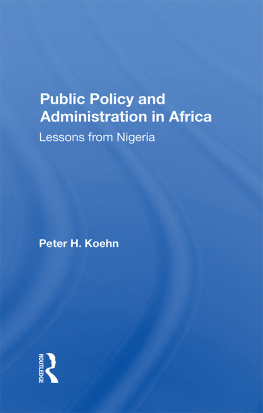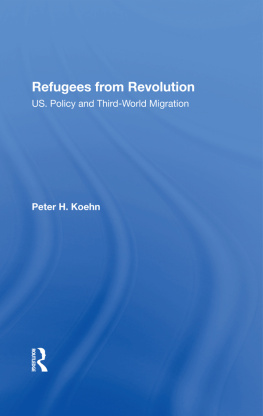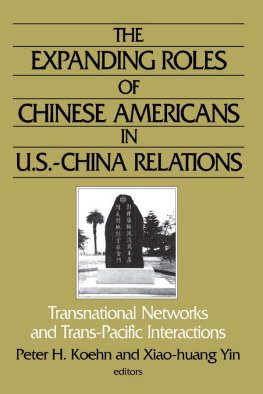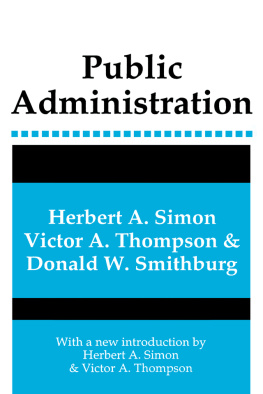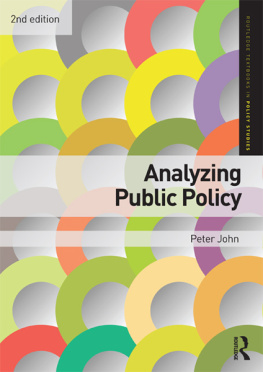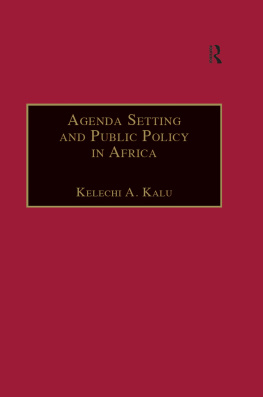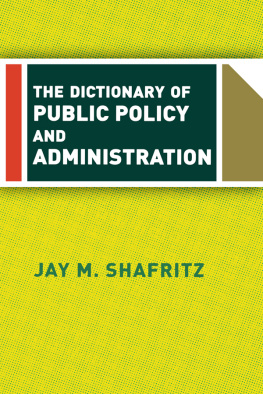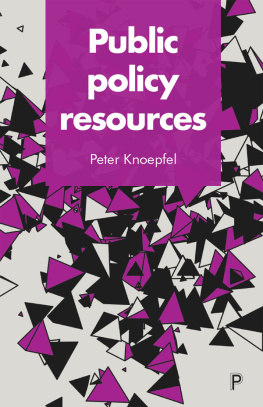Public Policy and Administration in Africa
Public Policy and Administration in Africa
Lessons from Nigeria
Peter H. Koehn
First published 1990 by Westview Press, Inc.
Published 2019 by Routledge
52 Vanderbilt Avenue, New York, NY 10017
2 Park Square, Milton Park, Abingdon, Oxon OX14 4RN
Routledge is an imprint of the Taylor & Francis Group, an informa business
Copyright 1990 Taylor & Francis
All rights reserved. No part of this book may be reprinted or reproduced or utilised in any form or by any electronic, mechanical, or other means, now known or hereafter invented, including photocopying and recording, or in any information storage or retrieval system, without permission in writing from the publishers.
Notice:
Product or corporate names may be trademarks or registered trademarks, and are used only for identification and explanation without intent to infringe.
Library of Congress Cataloging-in-Publication Data
Koehn, Peter H.
Public policy and administration in Africa: lessons from Nigeria /
by Peter H. Koehn.
p. cm. (Westview special studies on Africa)
Includes bibliographical references.
ISBN 0-8133-7757-9
1. BureaucracyNigeria. 2. Political planningNigeria.
3. NigeriaEconomic policy. 4. NigeriaPolitics and government.
5. State governmentsNigeria. 6. Local governmentsNigeria.
I. Title.
JQ3090.K64 1990
354.669'01dc20 89-22572
CIP
ISBN 13: 978-0-367-28476-3 (hbk)
In the preparation of this book, I have been assisted by a number of individuals and institutions. The Social Science Research Council, the University of Montana, and the Institute of Administration at Ahmadu Bello University provided important support for my research on state and local policy issues and administrative practice. The actual field work could only be accomplished with the cooperation of those directly involved in the processes investigated. For their patience and time, I am most grateful.
Students at A.B.U. enrolled in the Administrative Management Training Course, the Advanced Diploma in Local Government studies, and various post-graduate programs taught this instructor a great deal. I learned even more about the subjects addressed in this book from my colleagues. Of particular benefit in this connection has been professional association and personal friendship with Olatunde Ojo, Joseph Shekwo, Lawrence Ega, Halidu Abubakar, and Festus Nze. Nigerian students attending the University of Montana graciously continued the educational process following my return from their vibrant country. A sabbatical award from the University of Montana proved vital in connection with some of the material presented in this volume. Special thanks are extended to John Paden, Cheryl Johnson-Odim, Hans Panofsky, and Richard A. Hay, Jr., for their hospitality and efforts to ensure that the period I spent as Visiting Scholar at Northwestern University during that sabbatical year would be rewarding.
Several chapters in this volume have been heavily influenced by collaborative work with other scholars, or by external criticism. For instance, Gavin Williams provided a set of helpful comments on an earlier version of the agricultural policy discussion. During his tenure as Visiting Fulbright Scholar at the University of Montana, Olatunde Ojo coauthored the manuscript for Africa Today that formed the basis for the chapter on management of Nigeria's debt crisis. The first two chapters of this book can be attributed in large measure to Krishna Tummala's encouragement. Richard A. Hay, Jr., offered many useful suggestions concerning the study of land allocation and development planning. Richard Vengroff provided a useful set of comments related to the implementation of land-allocation policy in Africa. The late Abubakar Yaya Aliyu contributed generously to the analysis of local government in Nigeria. In addition, Henry F. Goodnow and James R. Scarritt, both of the University of Colorado, have greatly facilitated my work on public administration and politics in Africa over the past twenty years. Richard E. Stren's counsel played an important part in the decision to produce this volume.
A number of individuals deserve recognition for their assistance in the production stages of this book. At the University of Montana, I relied heavily on the diligence and patience of several typists. They include Susan Matule, Sue Koehn, Susan Mowrer, Loretta Edwards, and my wife, Aminata Khady Diop. It also has been a pleasure working with Sally Furgeson, Rebecca Ritke, and Barbara Ellington of Westview Press.
A decade has passed since I first arrived in Nigeria fully cognizant of the vast, historically and socially complex nature of the country. This book is intended to share what I have learned about public policy and administration in Africa over the past ten years. One factor stands out above all others in promoting that learning experience. That is the support and confidence extended by my Department Head at the Institute of Administration, professor A. Y. Aliyu. Taken in November 1987 from family, colleagues, and country while in the prime of his life and career, Yaya will never see this final product. It is my fervent hope, nevertheless, that it merits his confidence.
P. H. K.
Missoula
Chinua Achebe, the renowned writer, published a small book in 1983 that he entitled The Trouble with Nigeria . Achebe's tract treats administrative corruption, indiscipline, and the need for leadership. For similar reasons, this book could have been called The Trouble with Public Policy and Administration in Africa .
The conduct of public policy making and administration in Africa is fraught with controversy. Public service frequently attracts "the best and the brightest" of the country's labor force. Many profess commitment to development objectives and are eager to confront the most demanding challenges. Yet, the public servant is frequently characterized as self-serving, corrupt, power-hungry, and a burden on society. Finding his/her colleagues blamed, accused, and retrenched, the idealistic public administrator often reacts with loss of motivation and lowered morale.
Public Administration in Trouble
Public administration is indeed in trouble in Africa. Creative development policies and programs often are articulated, but far less frequently are seen through to completion. Some projects are abandoned in mid-stream? others benefit those with the least compelling needs. Citizen participation in planning and decision making receives lip service. The genuine delegation of authority is an exceptional event. Resources are scarce, evaluation is practically unknown, and maintenance is ignored. These conditions are fundamentally related to "the trouble with Nigeria" and other African states.
The basic will and capacity of state functionaries to serve as agents of development are increasingly questioned. What accounts for the predicament in which state employees currently find themselves? How can public servants extricate themselves from popular disillusionment and the political culture of cynicism? By applying a critical perspective to the Nigerian experience, this book aims to assist students of African politics and comparative administration who seek to comprehend the underlying reasons for the prevailing malaise and to identify promising alternatives to existing approaches.


